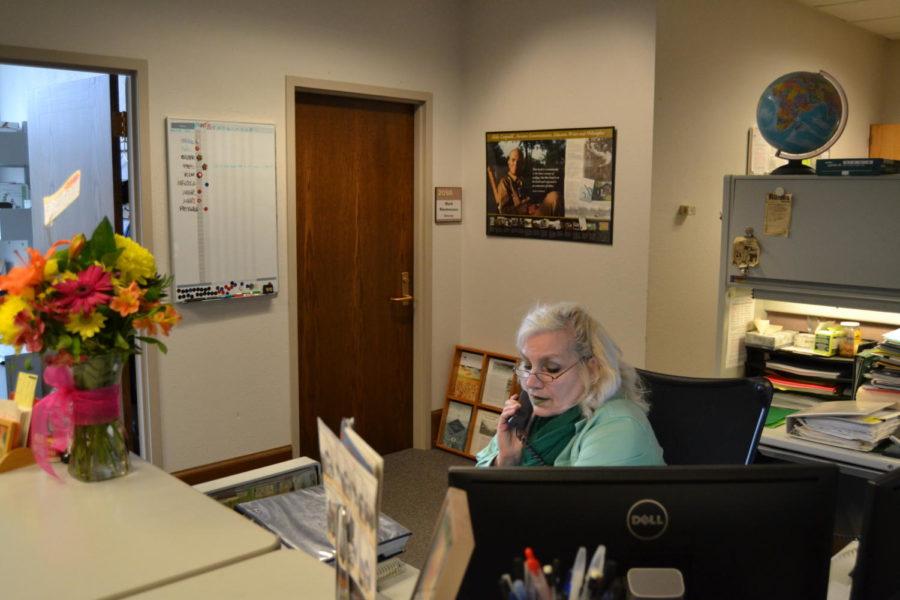Leopold Center faces uncertain future
Secretary, Blue Maas, answers phones at the Leopold Center in Curtis Hall April 18.
May 19, 2017
A week ago, Governor Branstad vetoed part of a bill, preserving the existence of the Leopold Center for Sustainable Agriculture, but leaving it with no state funding. The language still in the bill, however, has left some confusion as to the fate of the center.
One section redirecting state funding from the Leopold Center to the Iowa Nutrient Research Center remained. Another appears to move jurisdiction of the center to the College of Agriculture and Life Sciences.
“Some of it’s still up in the air. We’ve asked for some interpretation through Beardshear,” the director of the center, Mark Rasmussen, said. “It’s not as simple as some people think, [it’s not] turning off a switch.”
The Des Moines Register reported Gov. Terry Branstad defended his decision to preserve the Leopold Center but eliminate its state funding during a press conference this past Monday.
“They have already received significant bequests and other sources of funding, so they do have some other sources of funding,” Branstad told reporters at the conference. “But the Legislature had to make some tough decisions this year.”
The Alliance for Iowa State, a coalition of alumni, parents, students, staff, faculty and friends who advocate for the university’s land grant mission, released a statement Monday in response to the legislation.
The statements says the roughly $1.5 million the Leopold Center would have received through the Agriculture Management Account – one of four accounts comprising the Groundwater Protection Fund – will be directed to the Nutrient Research Center.
That $1.5 million was distributed by the Leopold Center for agricultural research in several areas. Now, the grants will be distributed by the Nutrient Research Center only for research that fits their purpose.
While the center will no longer receive any state funding, the Governor’s action allows the Leopold Center to continue to operate through private funds generated by its endowment account.
“What the Leopold Center was for 30 years is done,” Rasmussen said. “The 10 percent of our budget we have left won’t cover much … The foundation earnings are a little over 200,000 [dollars] a year.”
For now, the center is trying to do what the legislation says and cease all activity by July 1. All grants that were in progress have to be evaluated for what will be allowed to finish, what can be handed over to the Iowa Nutrient Research Center and which will have to be canceled.
The center is also trying to find a place to store the financial records from past grants, which must be retained for 10 years. Rasmussen’s office alone has about six square yards of files, not including the files that have been entirely digital.
Nothing is happening too quickly, partially because the center is still waiting for clarification and partially because the Dean of the College of Agriculture and Life Sciences, which in the law is supposed to take over for the Leopold Center following July 1 on any continuing projects, is out of the country for two weeks.
Mark Honeyman, associate dean of operations for the College of Agriculture and Life Sciences, has been working with Rasmussen and the Dean in the interim.
“He and I are meeting daily, he and her are meeting daily … we’re trying to work through these details,” Rasmussen said. “That, we do know is in the legislation, that it’s her responsibility to wind things down.”
Rasmussen actually found out the law had been signed when press began calling the office.
“They were being congratulatory, ‘oh congrats you’re saved and you got your funding!’ and then they had to come back and say ‘we read it wrong, in a hurry,'” Rasmussen said. “So it was kind of confusing that first hour or so after it was announced that late Friday.”
Rasmussen said the staff will all be moving on in the next few months, and the center will likely go down to one or two people, possibly chipping in on projects but no longer issuing grants. He also said there was a chance that next year a similar thing could happen in the legislature, where the Leopold Center could face closure, or even refunding.
Rasmussen himself will move back, perhaps part time with the center, to the Department of Animal Science, where he is tenured. Once there he hopes to pursue research and potentially teach again. Courses he has taught since directing the Leopold Center have to deal with micro-organisms found in the gastro-intestinal systems of animals.
For the summer, he plans to meet with many of the supporters who contacted legislators on behalf of the center.
Read more on the Center below.
















